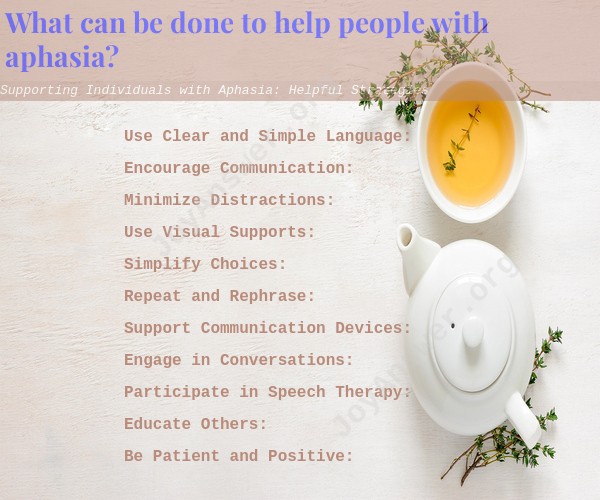What can be done to help people with aphasia?
Supporting individuals with aphasia is essential to help them communicate effectively and maintain their quality of life. Aphasia can be a frustrating and isolating condition, but with the right strategies and support, individuals can improve their communication abilities and overall well-being. Here are some helpful strategies for supporting people with aphasia:
Use Clear and Simple Language:
- Speak slowly and clearly, but avoid speaking in a condescending or exaggerated manner.
- Use simple and concise sentences.
- Give the person with aphasia ample time to process and respond.
Encourage Communication:
- Be patient and understanding, and let the person know that it's okay to take their time to communicate.
- Maintain eye contact and show that you are actively listening and interested in what they have to say.
- Use nonverbal cues, such as gestures and facial expressions, to help convey meaning.
Minimize Distractions:
- Choose a quiet and well-lit environment for conversations to reduce distractions and make it easier for the person to focus on communication.
Use Visual Supports:
- Visual aids, such as pictures, drawings, or written words, can assist in conveying messages and understanding.
- Consider using communication boards or apps designed for individuals with aphasia.
Simplify Choices:
- Offer choices with limited options to make decision-making easier. For example, "Would you like tea or coffee?" rather than "What would you like to drink?"
Repeat and Rephrase:
- If the person has difficulty understanding or expressing something, try repeating it in different words or using simpler language.
Support Communication Devices:
- Some individuals with severe aphasia may benefit from using communication devices or apps that provide speech output based on text or symbols.
Engage in Conversations:
- Encourage the person with aphasia to engage in conversations regularly, even if it's challenging.
- Engage in topics they are interested in to make communication more enjoyable and motivating.
Participate in Speech Therapy:
- Speech-language therapy is a crucial component of aphasia treatment. Encourage and support the person in attending therapy sessions.
Educate Others:
- Educate friends, family members, and caregivers about aphasia to ensure they understand the condition and can provide appropriate support.
Be Patient and Positive:
- Aphasia recovery can be a slow process, and setbacks may occur. Maintain a positive and encouraging attitude to help boost the person's confidence.
Support Social Interaction:
- Encourage the person to maintain social connections and participate in activities they enjoy. Social interaction can help improve communication skills and prevent isolation.
Advocate for Inclusivity:
- Promote awareness and inclusivity in the community and workplaces to create environments that accommodate individuals with aphasia.
Remember that aphasia is a highly variable condition, and strategies should be tailored to the individual's specific needs and abilities. It's essential to show empathy, respect, and patience when working with someone who has aphasia, as these qualities can greatly enhance their communication experience and overall well-being.
Supporting Individuals with Aphasia: Strategies and Resources
There are a number of strategies and resources that can be used to support individuals with aphasia. Here are a few examples:
Strategies:
- Be patient and understanding. It may take people with aphasia longer to communicate their thoughts and feelings.
- Use simple language and short sentences. Avoid using complex grammar and jargon.
- Break down complex tasks into smaller steps. This can help to make tasks less overwhelming and more manageable for people with aphasia.
- Provide visual and auditory cues. This can help to support people with aphasia's comprehension and communication.
- Encourage people with aphasia to participate in social activities. This can help them to practice their communication skills and to stay connected with others.
Resources:
- Speech-language therapy: Speech-language therapists can help people with aphasia to improve their communication skills and to develop strategies for coping with their language impairment.
- Aphasia support groups: Aphasia support groups can provide people with aphasia and their caregivers with support, information, and resources.
- Aphasia communication apps: There are a number of aphasia communication apps available that can help people with aphasia to communicate more effectively.
Aphasia Assistance: How to Help People Facing Communication Challenges
Here are some specific tips for helping people with aphasia to communicate:
- Make eye contact and get the person's attention before speaking.
- Speak slowly and clearly.
- Use short sentences and simple language.
- Avoid using slang or jargon.
- Give the person time to respond.
- Don't interrupt.
- Ask yes/no questions when possible.
- If the person is struggling to communicate, offer to help them find other ways to communicate, such as using gestures, pictures, or writing.
Empowering Aphasia Patients: Tips for Improved Communication and Understanding
Here are some tips for empowering aphasia patients to improve their communication and understanding:
- Encourage them to use their own words and phrases, even if they are not grammatically correct.
- Help them to identify and use communication strategies that work for them.
- Provide them with opportunities to practice their communication skills in a variety of settings.
- Celebrate their successes and encourage them to keep trying.
It is also important to remember that aphasia is a communication disorder, not a cognitive disorder. People with aphasia are still intelligent and capable individuals. It is important to treat them with respect and to dignify their communication attempts.
By following these tips, you can help people with aphasia to communicate more effectively and to live more fulfilling lives.











